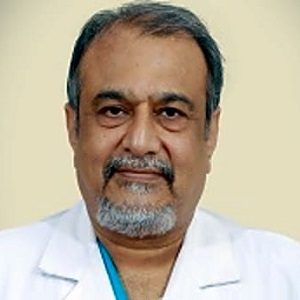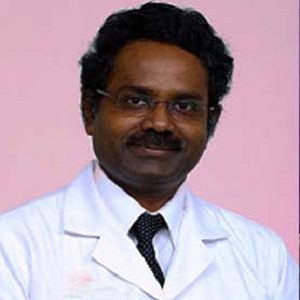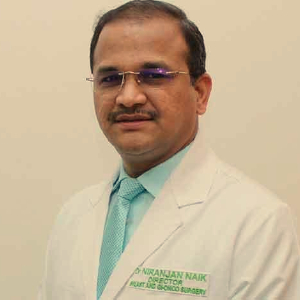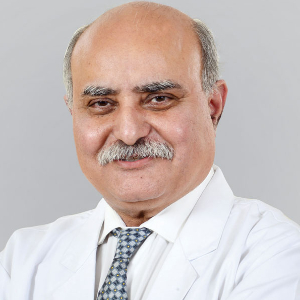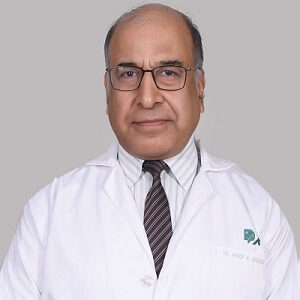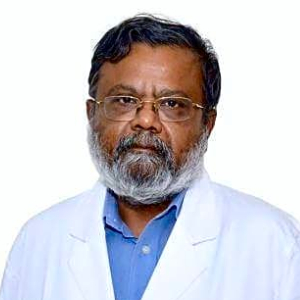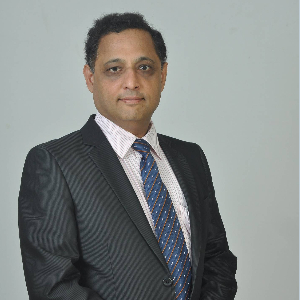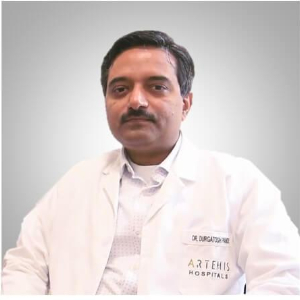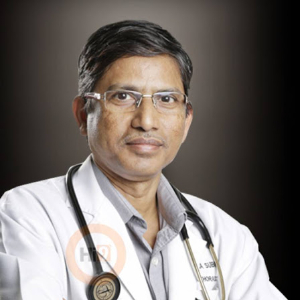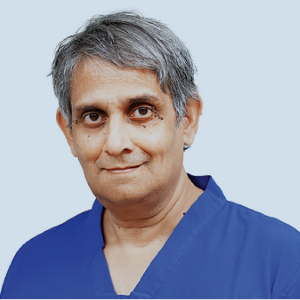Best Doctors in India for Mediastinoscopy
- Cardiac Surgeon, Cardiothoracic Surgeon, Vascular Surgeon; Chennai, India
- Over 37 years’ experience
Profile Highlights:
- LF Sridhar is a well-known Cardiothoracic & Vascular Surgeon in Chennai, now working at Apollo Hospital in Greams Road, Chennai, and has an experience of 37 years in this arena.
- Some of the services available with the doctor are Mitral/Heart Valve Replacement, Cardiac Pacing, and Intra – Arterial Thrombolysis, Pacemaker Implantation, and bypass surgery besides the regular OPD procedures.
- Cardiac Surgeon, Cardiothoracic Surgeon, Vascular Surgeon, Chennai, India
- Over 25 years’ experience
Profile Highlights:
- Dr. K Madhan Kumar is a well-known Cardiac Surgeon in Tamil Nadu, having many years of experience in the domain.
- His experience came from practice and teaching. These days, he is associated with Apollo Hospital Greams Road in Chennai as a Senior Consultant Cardiothoracic & Transplant Surgeon.
- Dr. Kumar has also completed Fellowships in Cardiothoracic Surgery at SGH in London as well as ECMO, VAD, and transplantation at HH in London.
- Surgical Oncologist, Gurugram, India
- Over 20 years’ experience
Profile Highlights:
- With 20+ years of experience, Dr. Niranjan Naik is one of the reputable names in the field of oncology and has performed more than 12000 onco-surgical operations so far, including many advanced and complex onco-surgical operations.
- Dr. Naik is generally considered one of the best Breast Cancer surgeons in India. He is also well versed in diagnostic and therapeutic endoscopic procedures.
- Cardio Thoracic & Vascular Surgeon, New Delhi, India
- Over 30 years’ experience
Profile Highlights:
- Dr. Ajay Kaul is a leading name in the field of Cardiothoracic and Vascular Surgery in India with over 3 decades of experience.
- He specializes in Coronary Bypass surgery and is one of the best with the highest number of total arterial coronary bypass surgery (4000+) by using two internal mammary arteries from the chest and without any cuts on arms and legs.
- He is also an expert in minimally invasive cardiac surgeries (MICS) and has performed more than 4000 MICS which is the highest by any cardiac surgeon in India.
- Cardiothoracic Surgeon and Vascular Surgeon, New Delhi, India
- Over 42 years’ experience
Profile Highlights:
- Dr. Anoop K Ganjoo is one of the best cardiologists & cardiothoracic surgeons in India with a total experience of 42 years.
- Dr. Ganjoo has a rich experience of over two decades in several complicated procedures, like Mitral valve repair and replacement, Peripheral and Coronary angiography & angioplasty, vascular surgery, ICD, diffuse coronary artery disease, Pacemaker, Radiofrequency ablation of arrhythmias, adult Cardiothoracic Surgery, CRT implantation, Balloon valvuloplasty, and PDA device closure.
- Thoracic Onco Surgeon, New Delhi, India
- Over 30 years’ experience
Profile Highlights:
- Dr. Sabyasachi Bal specializes in Thoracic Onco surgery and provides treatment for lung cancer, chest cancer, and other types of thoracic malignancies.
- He has over 30 years of experience in the field and has reformed thoracic cancer surgery in India. He has also added Robotic Thoracic Surgery to his list of specializations.
- Dr. Sabyasachi Bal’s primary focus lies in the management and treatment of cancers affecting the thoracic regions and organs near the lungs and chest of both adolescents and adults.
- Cardio Thoracic & Vascular Surgeon, Mumbai, India
- Over 30 years’ experience
Profile Highlights:
- Dr. Anvay Mulay is a well-known cardiothoracic and vascular surgeon in Mumbai and one of the best heart transplant surgeons in India.
- He holds an extensive experience of close to 3 decades and has been associated with renowned cardiac hospitals in India, US, and UK.
- Dr. Mulay is one of the top surgeons for Adult cardiac procedures in India. He was the first to introduce LVAD in West and Central India when he performed the surgery on a 49-year-old patient.
- Surgical Oncologist, Dwarka, New Delhi, India
- Over 20 years’ experience
Profile Highlights:
- Dr. Durgatosh Pandey is a renowned Surgical Oncologist.
- He has over 20 years of experience in surgical oncology in top cancer institutes in India.
- He was the Director of Surgical Oncology at Artemis Hospital, Gurugram.
- Currently, he is the Head of Oncology Sciences & Consultant – Surgical Oncology at Manipal Hospitals, Dwarka, New Delhi.
- Cardiothoracic & Vascular Surgeon, Hyderabad, India
- Over 30 years’ experience
Profile Highlights:
- Dr. G Rama Subramanyam is a well-known cardiothoracic and vascular surgeon who specializes in open-heart surgery and has performed more than 5000 such procedures since 1997.
- He is also an expert in Minimally Invasive Coronary Artery Bypass Grafting and heart valve surgeries that includes over 200 Ischemic mitral valve repair surgeries and 100 myxomatous and Rheumatic mitral valve repair surgeries.
- Heart Lung Transplant Surgeon, Chennai, India
- Over 40 years’ experience
Profile Highlights:
- Dr. K R Balakrishnan is a highly coveted cardiac surgeon in India and is probably one of the best heart transplant surgeons in the country.
- He has performed the largest number of heart transplants in the country including 180+ heart transplants, 23 lung transplants, and 9 heart & lung transplant procedures. He performed the first permanent artificial heart transplant in India with HeartMate II LVAD.
- Dr. K R Balakrishnan has over 40 years of experience in the field and has the expertise to perform cardiac surgeries on patients of all ages. He has performed over 16000 cardiac surgeries for various types of heart diseases and disorders till date.
Best Hospitals in India for Mediastinoscopy
Fortis Escorts Hospital, New Delhi
- City: New Delhi, India
Hospital Highlights:
- Over the last 33 years, the Fortis Escorts Heart Institute has set new standards in cardiac treatment with groundbreaking research. It is now known around the world as a centre of expertise for Cardiac Bypass Surgery, Interventional Cardiology, Non-invasive Cardiology, Paediatric Cardiology, and Paediatric Cardiac Surgery.
- The hospital has cutting-edge laboratories that perform a wide range of diagnostic tests in Nuclear Medicine, Radiology, Biochemistry, Haematology, Transfusion Medicine, and Microbiology.
- Fortis Escorts Heart Institute boasts a diverse group of bright and experienced doctors who are backed up by a team of highly qualified, experienced, and devoted support professionals as well as cutting-edge equipment such as the recently installed Dual CT Scan.
- Approximately 200 cardiac doctors and 1600 personnel currently collaborate to manage over 14,500 admissions and 7,200 emergency situations each year. The hospital now has a 310-bed infrastructure, as well as five cath labs and a slew of other world-class amenities.
Rela Hospital, Chennai
- City: Chennai, India
Hospital Highlights:
- RIMC is a multi-specialty hospital in a sprawling area of 36 acres located in Chromepet, Chennai, Tamil Nadu, India.
- The facility has 450 beds including 130 critical care beds, 9 operating rooms, modern reference laboratories and radiology services, and is conveniently located near road, rail and air transportation.
- RIMC is led and managed by world-renowned physicians committed to healthcare.
- RIMC offers the broadest range of clinical care, education, and research. The hospital offers state-of-the-art technology and modern treatment facilities designed to provide health care at an affordable cost.
- Rela Institute is driven by patient needs, comfort and confidence.
CARE Hospitals, Hyderabad
- City: Hyderabad, India
Hospital Highlights:
- CARE Hospitals were established in the year 2000, by CARE Group.
- The multispecialty hospital has 435 beds, including 120 critical care beds, with an annual inflow of 180000 outpatients and 16,000 in-patients.
- The hospital provides specialty medical services in Cardiology, Cardiothoracic Surgery, Pediatric Cardiology, Pediatric Cardiothoracic Surgery, Neurology, Neurosurgery, Nephrology, and Urology.
- The hospital has the first dual source, 128 slice CT scanner (for high precision cardiac imaging) – the first of its kind in south India.
- The hospital offers a wide range of accommodation facilities for the convenience of its varied patient base, ranging from general wards to super deluxe rooms.
Fortis Hiranandani Hospital, Mumbai
- City: Mumbai, India
Hospital Highlights:
- Fortis Hiranandani hospital was established in 2007.
- The hospital is an advanced tertiary care, multi-specialty hospital equipped with 149 beds.
- The hospital is equipped with a super ICU to provide emergency medical care to critically ill patients.
- The hospital is NABH accredited.
- The critical care facility in the hospital is augmented with the state-of-the-art facilities that facilitate speedier diagnosis and efficient monitoring.
- The hospital provides specialty medical services in cardiology, orthopedic science, pediatric science, neurology, diabetic care, urology, nephrology, ENT, obstetrics, gynecology, cosmetic surgery, bariatric surgery, neuro and spine care.
Fortis Hospital, Anandpur, Kolkata
- City: Kolkata, India
Hospital Highlights:
- Fortis Hospital, Anandapur, Kolkata is a world-class super-speciality equipped with the latest technologies in the medical world.
- The hospital is NABH accredited.
- This state-of-the-art facility specializes in cardiology and cardiac surgery, urology, nephrology, neurosciences, orthopaedics, digestive care, emergency care and critical care.
- The hospital, governed by integrated Building Management System (IBMS), has a pneumatic chute system, for quick vertical and horizontal transportation between floors, facilitating speedy transfer of patient specimens, documents, reports, and medicines to the concerned departments.
- The hospital also has a nephrology department with over 28 advanced dialysis units.
Fortis Hospital Banerghatta, Bengaluru
- City: Bengaluru, India
Hospital Highlights:
- Fortis Hospital Bannerghatta, Bengaluru was established in 2006.
- The hospital is a 276 bedded multi-specialty tertiary care facility.
- The hospital specializes in cutting-edge medical technology and dedicated patient care services.
- The hospital is equipped with state-of-the-art technologies like trans-radial angioplasty, trans-abdominal cardiac surgery, and computerized TKR navigation surgery.
- The hospital provides specialty medical services in cardiology, cardiac surgery, orthopedics, neurology, neuro-surgery, GI, and Minimal Access Surgery (MAS).
Fortis Hospital, Malar, Chennai
- City: Chennai, India
Hospital Highlights:
- Fortis Malar was established in 1992 and was formerly known as Malar Hospital.
- The hospital specializes in cutting-edge medical technology and dedicated patient care services.
- The hospital is multi-specialty, tertiary care facility with 180 beds.
- The hospital offers comprehensive medical care in specialties such as cardiology, cardio-thoracic surgery, neurology, neurosurgery, orthopedics, nephrology, gynecology, gastroenterology, urology, pediatrics, and diabetes.
Gleneagles Global Hospital, Parel, Mumbai
- City: Mumbai, India
Hospital Highlights:
- Gleneagles Global Hospital The 450-bed facility comprises of 17-stories, housing state-of-the-art infrastructure, and advanced medical care facilities.
- The hospital offers end-to-end clinical, surgical, and diagnostic services. It is equipped with a team of eminent medical professionals aided by qualified nurses and medical staff
- The Hospital offers advanced Endoscopic procedures, Hepatobiliary and Liver Surgeries, Surgical and Medical Gastroenterology, Bariatric Surgery, and Robotic surgery.
- The hospital is a center of excellence for Orthopedics, Joint Replacement, Knee Replacement, and Hip Replacement surgery.
Jaypee Hospital, Noida
- City: Noida, India
Hospital Highlights:
- Jaypee Hospital is the flagship hospital of the Jaypee Group.
- This hospital has commissioned 525 beds in the first phase and has been planned and designed as a 1200 bedded multi-specialty facility.
- It holds the accreditation of the NABH and NABL.
- The hospital has state-of-the-art infrastructure equipped with the latest technologies and modern equipment like 64 Slice PET CT, Dual Head 6 Slice SPECT CT, Gamma Camera, and Da Vinci Robotic Surgery for comprehensive robotic surgical solutions.
- It has special Centers dedicated to the major specialties to provide hassle-free and high-quality clinical care.
Manipal Hospital, Dwarka, Delhi
- City: New Delhi, India
Hospital Highlights:
- Manipal Hospitals, Dwarka, is a super-specialty hospital in Dwarka, New Delhi, which is a part of Manipal Hospitals Group.
- The hospital aims to provide the best treatment on par with international standards at a fraction of the cost.
- Equipped with 380 beds, the hospital is also one of the new age hospitals which are equipped fully with state-of-the-art infrastructure, cutting-edge technology as well as the latest and advanced clinical practices. The hospital also has 13 modular Operation theatres with 118 beds which are solely meant for critical care.
- The hospital comprises internationally acclaimed doctors and highly professional and experienced hospital and medical staff who are able to provide preventive, therapeutic, and diagnostic services all under one roof.
Mediastinoscopy
Mediastinoscopy, a procedure which a doctor uses to look inside your mediastinum, the area behind the breastbone which lies between the lungs. The organs in this area include the heart and its vessels, the lymph nodes, the trachea, the thymus and the esophagus.
This procedure is most commonly used for detecting and staging cancer. It is also ordered to detect infection as well as to confirm the diagnosis of a few certain conditions of the respiratory organs.
Purpose
The most common purpose of this procedure is the diagnosis of non-small cell lung carcinoma. The results which you can obtain from this procedure are generally very important in tailoring care for the patient.
Few other uses for this procedure include:
- The diagnosis and removal of mediastinal masses as well as enlarged lymph nodes.
- A mediastinal mass, such as thymoma can sometimes be removed using mediastinoscopy, depending on the size
- Lymphoma can be diagnosed via mediastinoscopy along with sarcoidosis which has a similar appearance on imaging.
- A sampling of lymph nodes can help to diagnose infectious processes such as fungal infections or tuberculosis.
- Mediastinoscopy can also be used in the diagnosis and treatment of mesothelioma.
- Benign (non-cancerous) mediastinal cysts can be taken out using this procedure as well.
Preparation
Make sure you inform your doctor about any medications that you are taking, which includes vitamins, herbs or any supplements. If you have any allergies to any medicines, you need to inform him/her as well.
Your doctor will most likely advise you to stop taking blood-thinning medicines, including aspirin before the test. You will also be most likely asked to avoid taking any food or drink at least several hours before your procedure. Your doctor or nurse will most likely provide you specific instructions. Make sure that you follow them, and ask questions if you are unable to understand anything.
Procedure
The procedure is generally done on an outpatient basis. First, the patient is put to sleep with the help of general anesthesia.
After this, a tube is put into your throat and hooked up to a breathing machine while the procedure is being done. A small cut is made above your breastbone. Then the mediastinoscope is moved slowly into the mediastinum. Any abnormal lymph nodes or areas which are seen through the camera are going to be removed or biopsied with the cutting tool and then they will be sent to the lab for checking. Then the mediastinoscope is removed and the cuts are closed. Once the procedure is complete, you will be removed from the breathing machine and be woken up gently.
This procedure generally takes around 60 minutes, but depending on what is being done, it can sometimes even take more than that.
After the procedure
After the procedure is done, you will be monitored closely to make sure that you don’t have any problems. As your anesthesia wears off, you might feel a bit groggy or confused for some time. It is likely that your mouth and throat will be numb for a while. You can only take food or drink after this numbness goes away.
However, after this numbness is gone, you might develop a sore throat, cough, or hoarseness till the next day or so. You might also experience some pain or numbness in the site where the cuts were made.
If it was performed as an outpatient procedure, you should most likely able to go home after a few hours, but you will require a ride home because of the medicines or anesthesia that you received. Some centers will generally not discharge people to go home in a cab and therefore you might need someone to drive you home. If this is a problem, you can talk with your healthcare provider, about any other resources available for helping you get home.
Your healthcare team will give you instructions on what you will be able to do or won’t be able to, in the next few hours after the procedure.
If biopsies were done as a part of this procedure, then the results should be ready within a few days, although the results of some tests on the biopsy samples may take longer. Generally, you might need to follow up with your doctor after the procedure to get your results.
Risks
People who undergo a mediastinoscopy generally don’t develop any complications.
Sometimes the mediastinoscope can cause temporary injury to a nerve, which might lead to hoarseness. Sometimes this might even be permanent.
In some rare cases, bleeding complications might require a transfusion or larger chest surgery. Air leaks from the lung might also occur and can require additional treatment. Generally, this can involve putting in a drainage tube between your ribs for a few days.
In very rare cases, mediastinoscopy might cause a collapsed lung or damage to the gullet.
You should inform your doctor immediately if you experience any of the following symptoms:
- Bleeding from the stitches.
- Swelling in your neck.
- Shortness of breath.
- Difficulty swallowing.
- A high temperature (fever)
- Severe chest pain.
- Hoarseness of your voice lasting more than a few days which continues to worsen.

